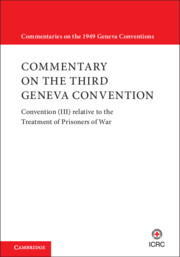 Commentary on the Third Geneva Convention
Commentary on the Third Geneva Convention Book contents
- Commentary on the Third Geneva Convention
- International Committee of the Red Cross
- Copyright page
- Contents
- Foreword by Peter Maurer
- Acknowledgements
- Abbreviations
- Introduction
- Preamble
- Part I General Provisions
- Part II General Protection of Prisoners of War
- Part III Captivity
- Part IV Termination of Captivity
- Part V Information Bureaux and Relief Societies for Prisoners of War
- Part VI Execution of the Convention
- Section I General provisions
- Article 126 Supervision by the Protecting Powers and the ICRC
- Article 127 Dissemination of the Convention
- Article 128 Translations. Implementing Laws and Regulations
- Article 129 Penal Sanctions
- Article 130 Grave Breaches
- Article 131 Responsibilities of the Contracting Parties
- Article 132 Enquiry Procedure
- Section II Final provisions
- Book part
- Sources
- Index
- References
Article 129 - Penal Sanctions
from Section I - General provisions
Published online by Cambridge University Press: 21 August 2021
- Commentary on the Third Geneva Convention
- International Committee of the Red Cross
- Copyright page
- Contents
- Foreword by Peter Maurer
- Acknowledgements
- Abbreviations
- Introduction
- Preamble
- Part I General Provisions
- Part II General Protection of Prisoners of War
- Part III Captivity
- Part IV Termination of Captivity
- Part V Information Bureaux and Relief Societies for Prisoners of War
- Part VI Execution of the Convention
- Section I General provisions
- Article 126 Supervision by the Protecting Powers and the ICRC
- Article 127 Dissemination of the Convention
- Article 128 Translations. Implementing Laws and Regulations
- Article 129 Penal Sanctions
- Article 130 Grave Breaches
- Article 131 Responsibilities of the Contracting Parties
- Article 132 Enquiry Procedure
- Section II Final provisions
- Book part
- Sources
- Index
- References
Summary
In 1949, the system of repression contained in the Geneva Conventions(hereinafter referred to as ‘the grave breaches regime’) was a remarkableinnovation in the law regulating international armed conflict. Article 129is common to the four Conventions.
- Type
- Chapter
- Information
- Commentary on the Third Geneva ConventionConvention (III) relative to the Treatment of Prisoners of War, pp. 1830 - 1874Publisher: Cambridge University PressPrint publication year: 2021
